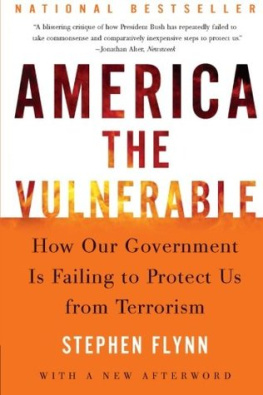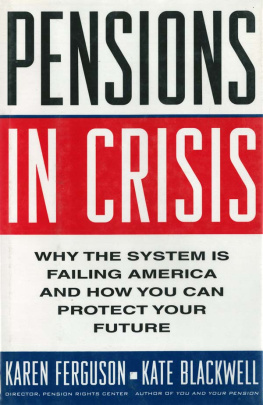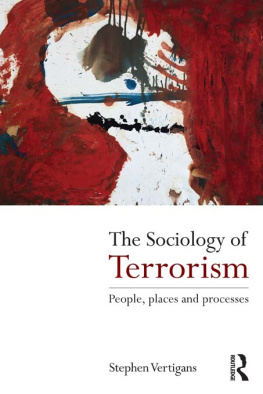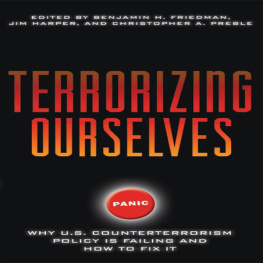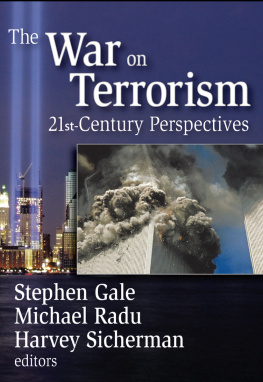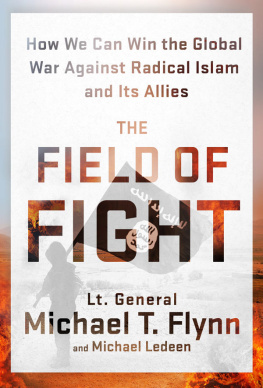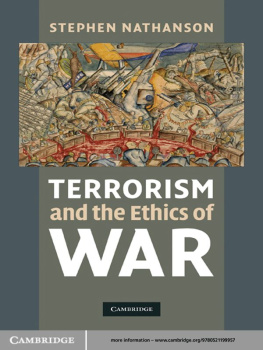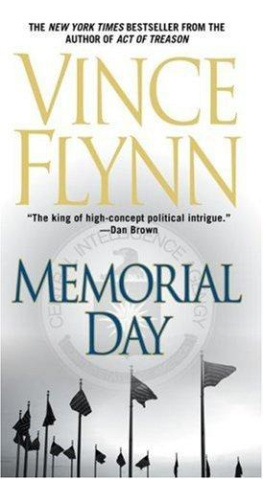America remains dangerously unprepared to prevent and respond to a catastrophic terrorist attack on U.S. soil. That was the chilling conclusion of an independent, bipartisan task force formed by the Council on Foreign Relations, which included two former secretaries of state, two former chairmen of the Joint Chiefs of Staff, a former director of the CIA and FBI, three Nobel laureates, and co-chaired by former Senators Gary Hart and Warren B. Rudman, who previously led the U.S. Commission on National Security. I served as the director and lead author of the report, which was released in October 2002.
This book goes to press eighteen months after this blue-ribbon panel released their sobering assessment under the title AmericaStill in Danger, Still Unprepared . Despite the passage of time, our state of homeland insecurity has not materially changed.
U.S. soldiers continue to make the ultimate sacrifice in our war on terrorism overseas. Meanwhile, Americans have been reluctant to take the pragmatic measures, which our affluence can well afford, to address vulnerabilities at home.
For two centuries, geography has been Americas biggest security asset. With oceans to the east and west and friendly neighbors to the north and south, the United States has been untrammeled by enemy boots on our ground. Inhabiting the most peaceful corner of the world has meant that captains of industry and urban planners have been able to treat security as a marginal issue. Those carefree days are now gone and unfortunately we have inherited critical infrastructures so open that they offer terrorists a vast menu of soft targets.
The president, Congress, governors, and Americas city mayors have taken some helpful measures to address some of our most glaring problems, particularly in how the government organizes itself to tackle the monumental task of improving our security. Unfortunately, we will not see the full effect of these post9/11 initiatives for some time to come. While it is unrealistic to expect that we can eliminate, overnight, vulnerabilities that have been decades in the making, we must do better.
Throughout our history, Americans have displayed an extraordinary degree of resolve, nimbleness, and self-sacrifice in times of war. Today we are breaking with that tradition. Our nation faces grave peril, but we seem unwilling to mobilize at home to confront the threat before us. Managing the danger that al Qaeda poses cannot be achieved by relying primarily on military campaigns overseas. There are no fronts in the war on terrorism. The 9/11 attacks highlighted the fact that our borders offer no effective barrier to terrorists intent on bringing their war to our soil. Nor do their weapons have to be imported, since they have proven how easy it is to exploit the modern systems we rely upon in our daily lives and use them against us.
My sense of foreboding about Americas current state of vulnerability predates 9/11. It has been welling up throughout my twenty-year career as a commissioned officer in the U.S. Coast Guard, which I spent as a sailor, college professor, and public-policy practitioner. In two commands at sea, I experienced firsthand how difficult it is to police our borders. While a teacher at the U.S. Coast Guard Academy and on fellowships to the Brookings Institution, the Annenberg School for Communication at the University of Pennsylvania, and the Council on Foreign Relations, I became preoccupied with the growing capabilities of criminals and terrorist organizations. I discovered how intransigent the federal bureaucracy could be to adapting to new threats while I was a director on the National Security Council staff and as an advisor for the U.S. Commission on National Security. When the attacks of September 11 came, I shared the feelings of horror that all Americans felt. But like most of the small cadre of individuals who had been keeping their eyes on al Qaeda, I was not surprised.
In 2000, I wrote an essay published by Foreign Affairs which included a scenario describing how Osama bin Laden might exploit our perilously exposed transportation system to smuggle and detonate a weapon of mass destruction on our soil. The article led to invitations to conduct briefings around Washington, D.C. In those pre9/11 presentations I maintained that these attacks would involve more than the loss of innocent lives, but would generate a spasmodic response to shut down the entire transportation sector as public officials struggled to determine what happened. This would be followed by a rash of poorly conceived new security mandates in the scramble afterward to reassure an anxious American public. The resultant economic and societal disruption would be precisely the kind of outcome that groups like al Qaeda aspire to achieve. My conclusion was straightforward. Given the enormous stakes, we should make transportation security a priority before terrorists strike.
These briefings proved to be enormously frustrating. Even those people who understood al Qaedas commitment to attacking America were generally reluctant to recognize the degree to which our guard was down at home. In the absence of specific intelligence, most policymakers were unwilling to acknowledge the threat to our transportation infrastructure was real. At the same time, the intelligence community was dedicating virtually no resources to assessing a threat posed by terrorists and criminals to ships, trains, trucks, planes, and containers. Those few who shared my concern were convinced that little could be done. The common refrain I heard was, Americans need a crisis to act. Nothing will change until we have a serious act of terrorism on U.S. soil.
Sadly, it turns out that even 9/11 has not served as a catalyst for the United States to take stock of its many vulnerabilities. Over the past two and a half years, I have traveled extensively around the nation, meeting with frontline agents, first responders, law enforcement officials, and civic groups. What I have found are pockets of innovation by dedicated public servants who are being tasked each day to do the impossible: to secure a nation that has not been mobilized to defend itself at home.
The United States has failed to secure its homeland. Many in Washington will likely protest this judgment, arguing that I do not adequately account for the progress they are making. But earning a passing grade is not only about making an effort. Just as any student knows he will fail an exam if he answers forty questions correctly yet leaves sixty blank, the measures that have been taken to protect the homeland must be judged against a standard that assesses their adequacy to handle the threat and the consequence, should those protective measures fail. I know how exposed our nation was prior to 9/11, and I have been closely monitoring what has been happening to improve our security since that tragic day. There are too many incompletes to justify a passing grade.
Critiquing where we are is a necessary stepping-off point for outlining where we must go. Every day that there is not an attack, Americans become increasingly wistful for a sense of pre9/11 normalcy. Perky reassurances by public officials that they have matters well in hand are not only inaccurate, but they remove the oxygen from a sustained effort to confront the ongoing terrorist threat. The war on terrorism is not one that can be permanently won. The means to conduct terrorist acts are too cheap, too available, and too tempting ever to be completely eradicated. Terrorism is a threat that we must constantly combat if we are to reduce it to manageable levels so that we can live normal lives free of fear. September 11 marked the end of an era during which we could go about our lives treating security as something only other people had to worry about.


